2021中考英语常考知识点必备
- 格式:pdf
- 大小:5.39 MB
- 文档页数:23
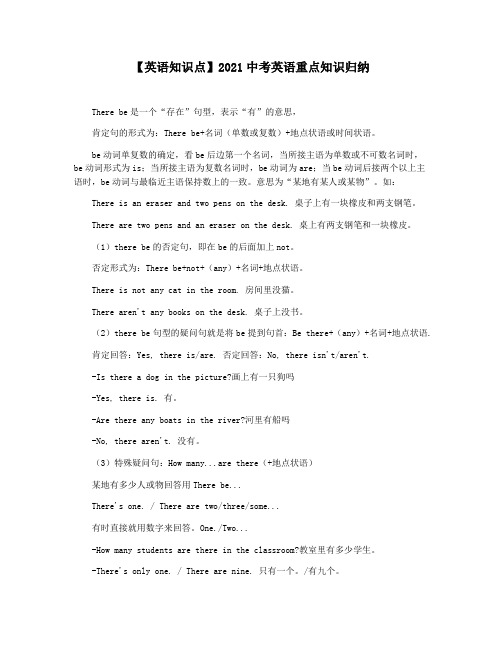
【英语知识点】2021中考英语重点知识归纳There be是一个“存在”句型,表示“有”的意思,肯定句的形式为:There be+名词(单数或复数)+地点状语或时间状语。
be动词单复数的确定,看be后边第一个名词,当所接主语为单数或不可数名词时,be动词形式为is;当所接主语为复数名词时,be动词为are;当be动词后接两个以上主语时,be动词与最临近主语保持数上的一致。
意思为“某地有某人或某物”。
如:There is an eraser and two pens on the desk. 桌子上有一块橡皮和两支钢笔。
There are two pens and an eraser on the desk. 桌上有两支钢笔和一块橡皮。
(1)there be的否定句,即在be的后面加上not。
否定形式为:There be+not+(any)+名词+地点状语。
There is not any cat in the room. 房间里没猫。
There aren't any books on the desk. 桌子上没书。
(2)there be句型的疑问句就是将be提到句首:Be there+(any)+名词+地点状语.肯定回答:Yes, there is/are. 否定回答:No, there isn't/aren't.-Is there a dog in the picture?画上有一只狗吗-Yes, there is. 有。
-Are there any boats in the river?河里有船吗-No, there aren't. 没有。
(3)特殊疑问句:How many...are there(+地点状语)某地有多少人或物回答用There be...There's one. / There are two/three/some...有时直接就用数字来回答。

2021中考英语的重点知识点现在分词变化规则知识点1、一般在词尾加-ing(一般-ing)。
例如:going,playing,knowing2、以不发音的字母e结尾,先去e再加-ing(去哑e)。
例如:making,arriving,coming3、以重读闭音节结尾,且词尾只有一个辅音字母时,先双写这个辅音字母,再加-ing(重闭单辅先双写)。
例如:running,stopping,preferring4、以-ie结尾,先将-ie改成y,再加-ing。
例如:tying,dying, lying口诀:现在进行ing,以e 结尾要去e,除去几个特殊词,系住tie-tying死去die-dying要躺下lie-lying,直接ie变成y,一元一辅双写辅(单音节的词)。
主谓一致知识点一.概念:主谓一致是指:1) 语法形式上要一致,即单复数形式与谓语要一致。
2) 意义上要一致,即主语意义上的单复数要与谓语的单复数形式一致。
3) 就近原则,即谓语动词的单复形式取决于最靠近它的词语,一般来说,不可数名词用动词单数,可数名词复数用动词复数。
例如:There is much water in the thermos.但当不可数名词前有表示数量的复数名词时,谓语动词用复数形式。
例如:Ten thousand tons of coal were produced last year.二.相关知识点精讲1.并列结构作主语时谓语用复数,例如:Reading and writing are very important. 读写很重要。
注意:当主语由and连结时,如果它表示一个单一的概念,即指同一人或同一物时,谓语动词用单数,and 此时连接的两个词前只有一个冠词。
例如:The iron and steel industry is very important to our life. 钢铁工业对我们的生活有重要意义。
典型例题The League secretary and monitor ___ asked to make a speech at the meeting.A. isB. wasC. areD. were答案B. 注:先从时态上考虑。
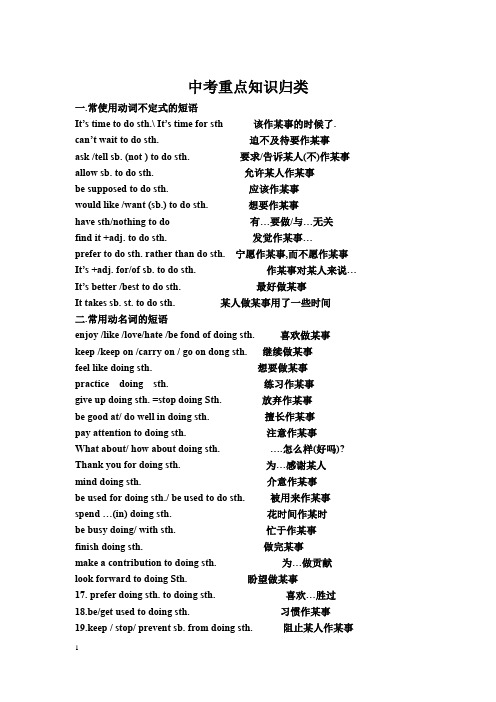
中考重点知识归类一.常使用动词不定式的短语It’s time to do sth.\ It’s time for sth 该作某事的时候了. can’t wait to do sth. 迫不及待要作某事ask /tell sb. (not ) to do sth. 要求/告诉某人(不)作某事allow sb. to do sth. 允许某人作某事be supposed to do sth. 应该作某事would like /want (sb.) to do sth. 想要作某事have sth/nothing to do 有…要做/与…无关find it +adj. to do sth. 发觉作某事…prefer to do sth. rather than do sth. 宁愿作某事,而不愿作某事It’s +adj. for/of sb. to do sth. 作某事对某人来说…It’s better /best to do sth. 最好做某事It takes sb. st. to do sth. 某人做某事用了一些时间二.常用动名词的短语enjoy /like /love/hate /be fond of doing sth. 喜欢做某事keep /keep on /carry on / go on dong sth. 继续做某事feel like doing sth. 想要做某事practice doing sth. 练习作某事give up doing sth. =stop doing Sth. 放弃作某事be good at/ do well in doing sth. 擅长作某事pay attention to doing sth. 注意作某事What about/ how about doing sth. ….怎么样(好吗)? Thank you for doing sth. 为…感谢某人mind doing sth. 介意作某事be used for doing sth./ be used to do sth. 被用来作某事spend …(in) doing sth. 花时间作某时be busy doing/ with sth. 忙于作某事finish doing sth. 做完某事make a contribution to doing sth. 为…做贡献look forward to doing Sth. 盼望做某事17. prefer doing sth. to doing sth. 喜欢…胜过18.be/get used to doing sth. 习惯作某事19.keep / stop/ prevent sb. from doing sth. 阻止某人作某事20.have problems/ difficulty (in) doing sth.做某事有….麻烦三.省略to 的动词不定式的短语一感二听三使役四看半帮助see/ hear/ feel/ notice/ look at /listen to sb. do sth.看见/听见/感觉/注意某人作某事make /let /have sb. do sth. 使/让某人做某事help sb. (to) do sth/ with sth. 帮助某人作某事had better (not) to sth. 最好(不)做某事Why don’t you/ not do sth. 为什么不作某事Would /Will / Could you please (not) do sth. 请你(不)作某事好吗?四、同(近)义词比较stop to do sth. 停下来正在做的事去作另一件事stop doing sth. 停止正在作的事e.g. When the teacher came into the classroom, the students stopped talking. After he worked for an hour, he stopped to have a rest.forget / remember to do sth. 忘记/记得要去作某事forget / remember doing sth. 忘记记得曾经做过某事e.g. Please remember to bring my book to school.I remember doing my homeworkused to do sth. 过去常常作某事be used to do sth. 被用来作某事be used to doing sth. 习惯于作某事eg. My father used to smoking.Wood is used to make paper.I am used to getting up early.So +be/助动词/情态动词+ 主语…也一样So +主语+be/助动词/ 情态动词是呀,的确如此,表示赞同别人的观点Neither + be /助动词/ 情态动词+主语…也不一样(用于否定句)e.g. He has been to Beijing. So have I.It’s a fine day. So it is.She doesn’t like eggs. Neither do I.too+adj. /adv…to do sth. 太…而不能…so +adj. /adv + that(从句) 如此…以致…such +(a/an +adj.)+n.+ that(从句) 如此…以致…(not) enough (for sb.) to do sth. (对某人来说)做某事(不)够e.g. The boy is too young to go to school.The boy is so young that he can’t go to school.He is such a young boy that he can’t go to school.The boy is not old to go to school.16…When(当…的时候), if (如果), as soon as(一…就), until(直到…才), unless(除非/如果…不)这几个词引导的时间或条件状语从句时,主句要用一般将来时.,从句要用一般现在时表将来之意e.g. I will call you when he comes.If it doesn’t rain tomorrow, we will have a picnic.As soon as I get to Beijing, I’ll come to see you.He won’t go to bed until his parents come back.Unless you work hard, you won’t catch up with others.五、常考知识点keep +adj.(closed, open)保持…状态keep (sb.) doing sth. 继续做某事/使某人老是做某事e.g. Everyone should keep our classroom clean.It’s too late, but he still keeps working.Lily always keeps us waiting for her.make + n. 使某人成为make + sb. + adj. 使某人…make sb. do sth. 使某人做某事Sb. be made to sth. 某人被迫做某事e.g. We made Peter our monitor.Books make us happy.He often makes me laugh.The workers were made to work 12 hours a day.I don’t think that 我认为…不e.g. I don’t think you are right,are you?It’s /has been+ some time +since+一般过去时…自从…以来有多久了e.g. It has been two years since we met last time.What do you mean by/ What does .. mean? 是什么意思?e.g. What do you mean by “computer”?/What does “computer”mean?What do you think of…/How do you like …? 你认为…怎么样?e.g. What do you think of this film /How do you like this film?What is/was/will …be like? ..怎么样?e.g. What is the weather like?What will the life in the future be like?It’s said/ reported that… 据说/据报道e.g. It’s said that the population of the word would be 6 billion in 2o5o. one of the 形容词最高级+名词复数…其中之一e.g. Shanghai is one of the biggest cities in China.Neither…nor… 既不…也不(两者都不)either or… 要么…要么/或者…或者/不是…就是not only…but also…不但…而且(以上三个词做主语时,要用就近原则) e.g. Neither you nor he has been to the USA.Either he or you go to the park.Not only my mother but also my father is a teacher.比较级+ than +any other +名词单数…比其余任何一个…比较级+ than + the other+名词复数Eg. Shanghai is bigger than any other city/the other cities in China. 19…“多.。

中考英语高频考点+句型详细解析-人教主题句:I was so tired that I went to sleep early.我太累了,所以早早就睡觉了。
考点一、so…that…结构(1) so + 形容词/ 副词+ that 从句,表示"如此……以至于……", that 后接结果状语从句。
It's so hot that I can't sleep. 天气热得我不能入睡。
He got up so late that he missed the early bus. 他起床太晚了以至于错过了早班车。
(2) so + 形容词+ a / an + 单数可数名词+ that从句,表示"如此……的人或物以至于……"Tom is so clever a boy that we all like him.汤姆是如此聪明的一个男孩,我们都喜欢他。
(3) such…that…与so…that…用法辨析such…that…结构也可以引导结果状语从句,表示"如此……的人或物以至于……,通常such 后接名词,具体结构如下:①such + a / an + 形容词+ 单数名词+ that 从句Tom is such a clever boy that we all like him.汤姆是如此聪明的男孩以至于我们都喜欢他。
②such + 形容词+ 复数名词/ 不可数名词+ that 从句It was such bad weather that we had to stay at home.天气如此糟糕以至于我们不得不呆在家里。
They are such interesting books that I want to read them once more.他们是如此有趣的书,我想再次阅读它们。
(4) so…that…与such…that…之间的转换He was such a brave boy that he was praised by the teacher. = The boy was so brave that he was praised by the teacher.这个男孩非常勇敢,因而受到了老师的表扬。
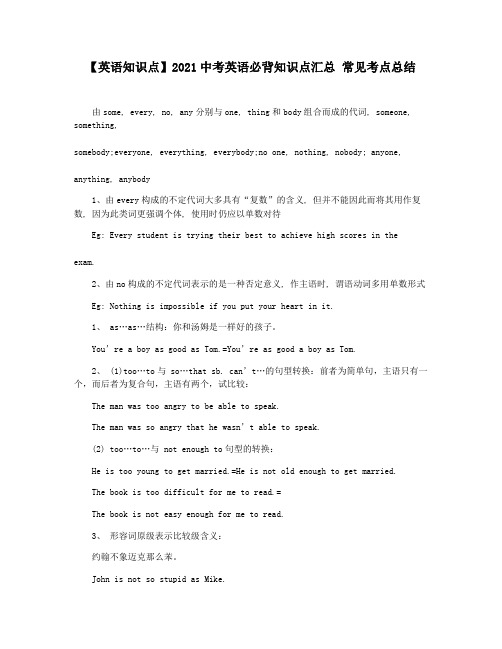
【英语知识点】2021中考英语必背知识点汇总常见考点总结由some, every, no, any分别与one, thing和body组合而成的代词, someone, something,somebody;everyone, everything, everybody;no one, nothing, nobody; anyone, anything, anybody1、由every构成的不定代词大多具有“复数”的含义, 但并不能因此而将其用作复数, 因为此类词更强调个体, 使用时仍应以单数对待Eg: Every student is trying their best to achieve high scores in theexam.2、由no构成的不定代词表示的是一种否定意义, 作主语时, 谓语动词多用单数形式 Eg: Nothing is impossible if you put your heart in it.1、as…as…结构:你和汤姆是一样好的孩子。
You’re a boy as good as Tom.=You’re as good a boy as Tom.2、(1)too…to与so…that sb. can’t…的句型转换:前者为简单句,主语只有一个,而后者为复合句,主语有两个,试比较:The man was too angry to be able to speak.The man was so angry that he wasn’t able to speak.(2) too…to…与 not enough to句型的转换:He is too young to get married.=He is not old enough to get married.The book is too difficult for me to read.=The book is not easy enough for me to read.3、形容词原级表示比较级含义:约翰不象迈克那么苯。
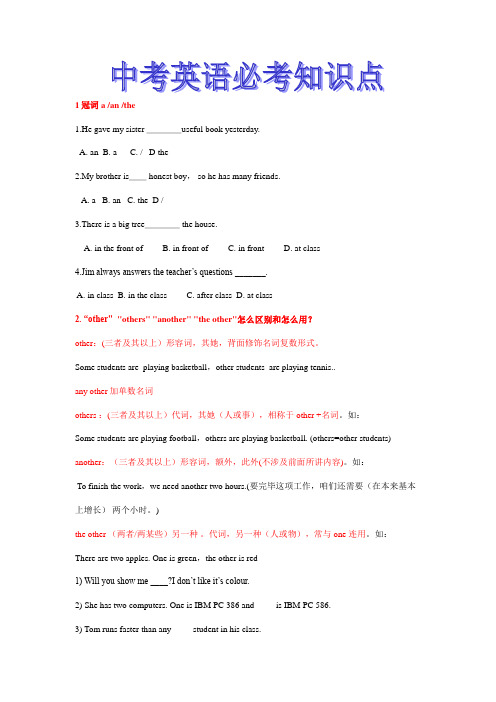
1冠词 a /an /the1.He gave my sister ____useful book yesterday.A. anB. aC. / D the2.My brother is__ honest boy, so he has many friends.A. aB. anC. the D /3.There is a big tree____ the house.A. in the front ofB. in front ofC. in frontD. at class4.Jim always answers the teacher’s questions _______.A. in classB. in the classC. after classD. at class2. “other" "others" "another" "the other"怎么区别和怎么用?other:(三者及其以上)形容词,其她,背面修饰名词复数形式。
Some students are playing basketball,other students are playing tennis..any other加单数名词others :(三者及其以上)代词,其她(人或事),相称于other +名词。
如:Some students are playing football,others are playing basketball. (others=other students) another:(三者及其以上)形容词,额外,此外(不涉及前面所讲内容)。
如:To finish the work,we need another two hours.(要完毕这项工作,咱们还需要(在本来基本上增长)两个小时。
)the other (两者/两某些)另一种。

【英语知识点】2021年中考英语必备知识点1.putdown放下shutdown把…关上cutdown砍掉edown下来、落下slowdown减缓、放慢sitdown坐下writedown写下getdown下来,降落2.afterall毕竟.终究afterthat于是.然后dayafterday日复一日地oneafteranother相继.挨次soonafter不久以后thedayaftertomorrow后天3.eupwith找到、提出catchupwith赶上wakeup弄醒、醒来sendup发射openup开设、开办growup长大pickup拾起、捡起handsup举手eatup吃光cleanup打扫干净giveupdoingsth.=stopdoingsth.放弃做某事4.arriveat/in+n.到达getto+n.到达reach+n.到达arrive/get+adv.到达5.get…back退还,送回去.取回giveback归还eback回来atthebackof在…的后面ontheway(back)home在回家路上1、(see、hear、notice、find、feel、listento、lookat(感官动词)+doeg:ilikewatchingmonkeysjump2、(比较级and比较级)表示越来越怎么样3、apieceofcake=easy小菜一碟(容易)4、agreewithsb赞成某人5、allkindsof各种各样akindof一样6、allovertheworld=thewholeworld整个世界7、alongwith同……一道,伴随……eg:iwillgoalongwithyou我将和你一起去thestudentsplantedtreesalongwiththeirteachers学生同老师们一起种树8、assoonas一怎么样就怎么样9、asyoucansee你是知道的10.askfor……求助向…要…(直接接想要的东西)eg:askyouformybook11、asksbforsth向某人什么12、asksbtodosth询问某人某事asksbnottodo叫某人不要做某事感谢您的阅读,祝您生活愉快。
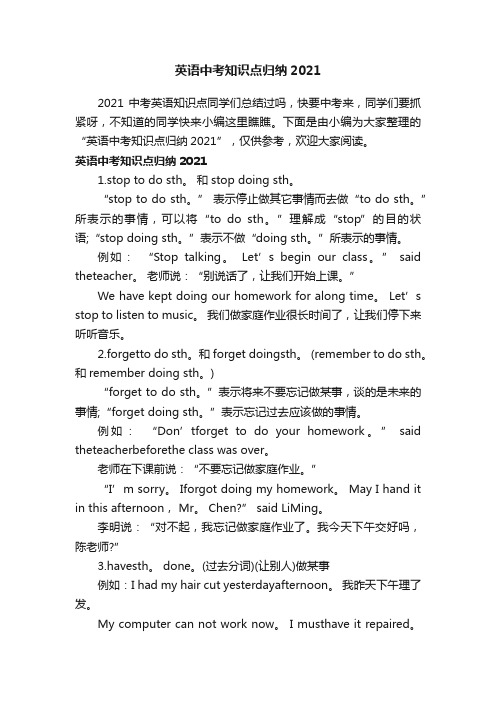
英语中考知识点归纳20212021中考英语知识点同学们总结过吗,快要中考来,同学们要抓紧呀,不知道的同学快来小编这里瞧瞧。
下面是由小编为大家整理的“英语中考知识点归纳2021”,仅供参考,欢迎大家阅读。
英语中考知识点归纳20211.stop to do sth。
和stop doing sth。
“stop to do sth。
” 表示停止做其它事情而去做“to do sth。
”所表示的事情,可以将“to do sth。
”理解成“stop”的目的状语;“stop doing sth。
”表示不做“doing sth。
”所表示的事情。
例如:“Stop talking。
Let’s begin our class。
” said theteacher。
老师说:“别说话了,让我们开始上课。
”We have kept doing our homework for along time。
Let’s stop to listen to music。
我们做家庭作业很长时间了,让我们停下来听听音乐。
2.forgetto do sth。
和forget doingsth。
(remember to do sth。
和remember doing sth。
)“forget to do sth。
”表示将来不要忘记做某事,谈的是未来的事情;“forget doing sth。
”表示忘记过去应该做的事情。
例如:“Don’tforget to do your homework。
” said theteacherbeforethe class was over。
老师在下课前说:“不要忘记做家庭作业。
”“I’m sorry。
Iforgot doing my homework。
May I hand it in this afternoon, Mr。
Chen?” said LiMing。
李明说:“对不起,我忘记做家庭作业了。
我今天下午交好吗,陈老师?”3.havesth。
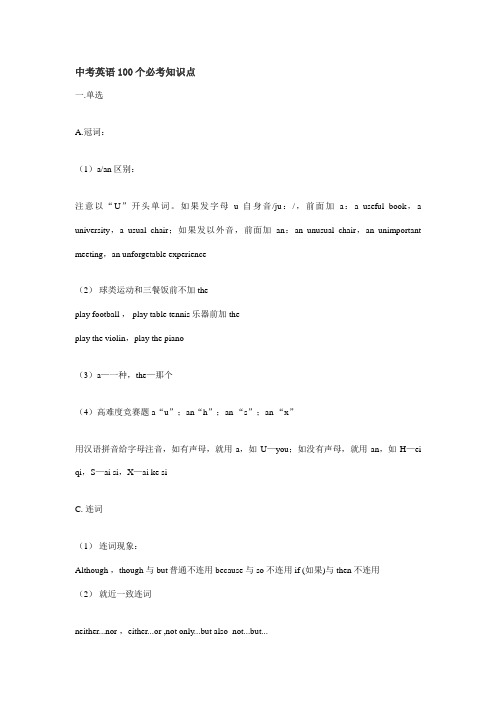
中考英语100个必考知识点一.单选A.冠词:(1)a/an 区别:注意以“U”开头单词。
如果发字母u自身音/ju:/,前面加a:a useful book,a university,a usual chair;如果发以外音,前面加an:an unusual chair,an unimportant meeting,an unforgetable experience(2)球类运动和三餐饭前不加theplay football , play table tennis乐器前加theplay the violin,play the piano(3)a—一种,the—那个(4)高难度竞赛题a“u”;an“h”;an “s”;an “x”用汉语拼音给字母注音,如有声母,就用a,如U—you;如没有声母,就用an,如H—ei qi,S—ai si,X—ai ke siC. 连词(1)连词现象:Although ,though 与but普通不连用because 与 so 不连用 if (如果)与then 不连用(2)就近一致连词neither...nor ,either...or ,not only...but also not...but...(3)连接句子与to do 形式because +句子(有完整主谓构造)because of +介词宾语(名词等)in order to do (in order not to do ) in order that +句子so as to so as that +句子 so...that +句子too...to do enough to do so good a book that +句子such a good book that+句子 so good that+句子(4)重要联词应用unless(=if not)除非 or 否则(威胁,劝告) as if / as though (好像)even if / even though (虽然) not...until (直到...才)D. 介词(1)介词+doing 介词+ 代词宾格形式 Neither of us is late.The book is for you. The knife is used for cutting things.Tom is sitting between him and me.(禁用“I”)关联记忆:介意 Mind + doingWould you mind my smoking here?(2) on in at 用法:表时间:on(天优先,只要涉及天概念就用on); in(时段); at (时刻)on the morning of April 1st. on a rainy night 在一种雨天夜晚at the same time(3)表随着:with / without ,或doing She is a girl with long hair.She is a girl wearing a new dress.(4)表方式: by bike,on foot 没有冠词“a”或名词复数What time is it by your watch? The boss pays us by week.He beat her with a book.(with后要带a或复数)speak in English Write in ink(5)介词(不加the)+名词at table 在桌旁,且在吃饭(两层意思)at the table 在桌旁,详细干什么不清晰at school in the schoolE. 名词(1)单复数特殊变化:男、女、脚foot-feet、牙、鹅goose-geese、孩子people(可数名词),sheep,deer(鹿)单复数同形中、日不变;英、法a-e;美、德该死(加S)Amercians,Germans(2)名词复数重心转移:This is an old pair of shoes. I want a new pair .(3)带性别复合词组:women(变) doctors(变)bus lines(只变最后一词)F. 动词(1)动词变化三大黄金法则:主谓一致,就近一致,双动词关系主谓一致:谓语动词跟着主语发生变化第三人称单数现象(集体名词做主语)Our class are playing football now (与人关于动作)Our class is a small one (整体)主谓一致之就近一致(必考):There be 句型Either or Neither...nor...not only...but also.. Not only they but also I am wrong.时态一致:从句与主句时态一致He said he had been there for an hour.He said the sun is bigger than the moon.(自然规律自然现象用普通当前时态) He said the moon is running around the earth.(错误,应改为普通当前时态)时态一致之时态变异(必考):A——瞬间动词-ing形式表将来The plane is taking off in an hour. The old man is dying.(将要死了)B——条件状语从句:普通当前时表将来I don't know if he will come tomorrow. If he comes,I will call you.I will ring you as soon as I finish my work.I won’t go out until my homework is done.典型考题:A—I will go swimming. B—If you go,so will I.双动词关系:单句中,若有两个动词(be动词,行为动词,不涉及助动词),她们关系有四种:and 连接——动作先后或并列发生,先后形式一致改为to do——动作未做,准备做改为doing——动作正在做或已做改为-ed 形式——后一动作被动发生特例:* 使、让(make ,let, have)积极不带to,被动带tomake sb. do /make sb not do/be made to do let sb. do* The teacher asked the students to stop talking and to listen to her.* I have my carrepaired.(我请人修理了我车。
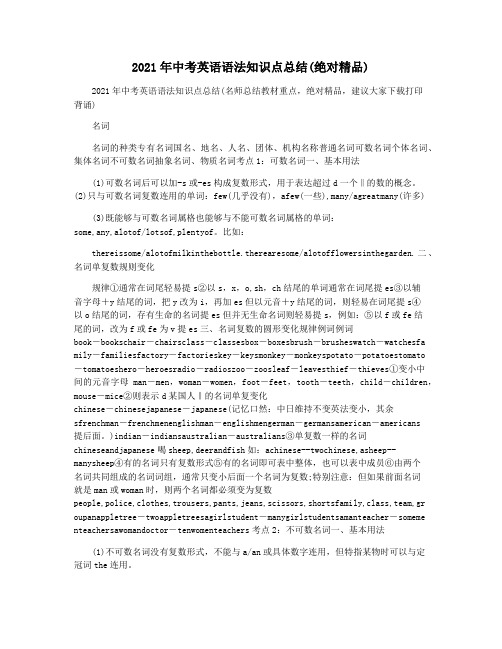
2021年中考英语语法知识点总结(绝对精品)2021年中考英语语法知识点总结(名师总结教材重点,绝对精品,建议大家下载打印背诵)名词名词的种类专有名词国名、地名、人名、团体、机构名称普通名词可数名词个体名词、集体名词不可数名词抽象名词、物质名词考点1:可数名词一、基本用法(1)可数名词后可以加-s或-es构成复数形式,用于表达超过d一个‖的数的概念。
(2)只与可数名词复数连用的单词:few(几乎没有),afew(一些),many/agreatmany(许多)(3)既能够与可数名词属格也能够与不能可数名词属格的单词:some,any,alotof/lotsof,plentyof。
比如:thereissome/alotofmilkinthebottle.therearesome/alotofflowersinthegarden.二、名词单复数规则变化规律①通常在词尾轻易提s②以s,x,o,sh,ch结尾的单词通常在词尾提es③以辅音字母+y结尾的词,把y改为i,再加es但以元音+y结尾的词,则轻易在词尾提s④以o结尾的词,存有生命的名词提es但并无生命名词则轻易提s,例如:⑤以f或fe结尾的词,改为f或fe为v提es三、名词复数的圆形变化规律例词例词book―bookschair―chairsclass―classesbox―boxesbrush―brusheswatch―watchesfa mily―familiesfactory―factorieskey―keysmonkey―monkeyspotato―potatoestomato―tomatoeshero―heroesradio―radioszoo―zoosleaf―leavesthief―thieves①变小中间的元音字母man―men,woman―women,foot―feet,tooth―teeth,child―children,mouse―mice②则表示d某国人‖的名词单复变化chinese―chinesejapanese―japanese(记忆口然:中日维持不变英法变小,其余sfrenchman―frenchmenenglishman―englishmengerman―germansamerican―americans提后面。
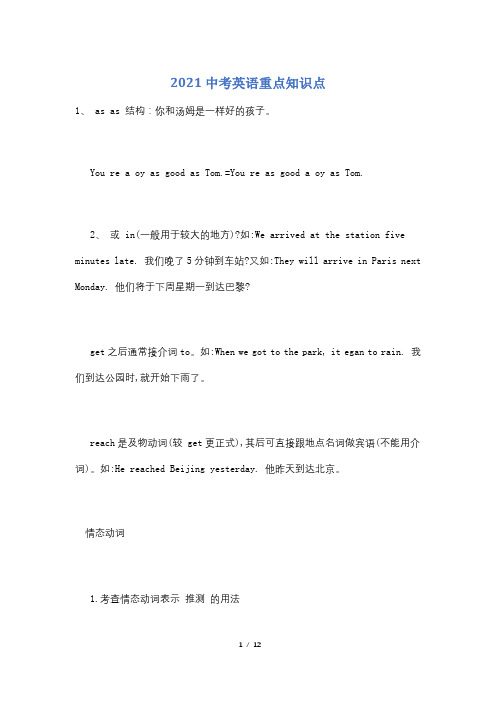
2021中考英语重点知识点1、 as as 结构:你和汤姆是一样好的孩子。
You re a oy as good as Tom.=You re as good a oy as Tom.2、或 in(一般用于较大的地方)?如:We arrived at the station five minutes late. 我们晚了5分钟到车站?又如:They will arrive in Paris next Monday. 他们将于下周星期一到达巴黎?get之后通常接介词to。
如:When we got to the park, it egan to rain. 我们到达公园时,就开始下雨了。
reach是及物动词(较 get更正式),其后可直接跟地点名词做宾语(不能用介词)。
如:He reached Beijing yesterday. 他昨天到达北京。
情态动词1.考查情态动词表示推测的用法[考点快忆] 表示肯定推测的情态动词有:must 一定;准是,may 也许;可能,might 或许表示否定推测的情态动词有:can t 不可能, couldn t 不会,may not 也许不,might not 或许不 can表示推测时不用于肯定句,may 表示推测时不用于疑问句。
2.考查情态动词引起的一般疑问句的答语[考点快忆] 回答must时,肯定答语用must,否定答语用needn t或don t have to。
回答need时,肯定答语用must,否定答语用needn t。
回答may时,肯定答语用may,否定答语用mustn t 或can t。
3.考查情态动词的意义[考点快忆] must 必须 have to 不得不 need 必须;需要 can(could) 能;可能 may (might) 可以;可能 shall,will (would) 将;会;愿意;要 should 应当。
had etter (not) + 动词原形表示建议;have to / has to / had to的否定,疑问形式要借助于助动词do / does / did。

中考英语考点总结编辑整理:尊敬的读者朋友们:这里是精品文档编辑中心,本文档内容是由我和我的同事精心编辑整理后发布的,发布之前我们对文中内容进行仔细校对,但是难免会有疏漏的地方,但是任然希望(中考英语考点总结)的内容能够给您的工作和学习带来便利。
同时也真诚的希望收到您的建议和反馈,这将是我们进步的源泉,前进的动力。
本文可编辑可修改,如果觉得对您有帮助请收藏以便随时查阅,最后祝您生活愉快业绩进步,以下为中考英语考点总结的全部内容。
中考英语考点汇总第一部分:词法中考考点一、名词一、名词的复数:1.名词变复数的规则形式1)。
一般情况下直接加s book--—---books cup-—--—cups 2).以辅音字母+y结尾的,先变y为i再加es . city——--——-cities family--——-families 3)。
以s、x、sh、ch结尾的加es 。
bus-—---buses wish-—----wishes watch-—————wathes 4).以o结尾的多数加S 初中阶段只有三个单词加es .tomato—--—-tomatoes potato—-—---potatoes hero—---—heroes 5).以f、fe 结尾的,先把f、fe变v 再加es 。
leaf—-——leaves self—--selves shelf—--—shelves life-—--lives thief—-—thieves 2.少数名词的复数形式是不规则的。
man-—--men woman—--women child-—--children foot————-feet tooth———-teeth mouse-—-mice 3。
单数和复数形式相同。
deer———deer fish—-——fish sheep———-sheep Chinese —-—-Chinese Japanese-—-Japanese 4。

中考必考知识点ed to do 过去常常…Dad used to get up late.2.be \ get used to doing 习惯于做…Dad is used to getting up early now.3.(sth) be used to do 某物被用来。
The money is used to help the poor.4. so...that 如此…以至于…She was so angry about what he did that she went out without saying a word.4.so that.../in order that/ in order to...以便、为了….She spoke loudly so that everyone could hear her clearly.6. Would rather do A than do Bprefer doing A to doing Bprefer to do A rather than do BI would rather stay at home than go shopping.I prefer staying at home to going shopping.I prefer to stay at home rather than go shopping.7.both...and... 既…又…/ 两者都….Both my parents and my uncle have been to HK.8. Not only...but also...不但…而且….Not only my parents but also my uncle has been to HK.9. Neither ...nor... 既不….也不….The weather in England is neither too cold in winter nor too hot in summer. 10. Either...or... 要么….要么…Either Tom or Jack will take part in the competition.11. Have gone to... 去了某地…(未回)Where’s Helen? She has gone to the teachers’ office.12. Have been to... 去过某地….(已回)I have been to Beijing twice.13. Have been in... 已在某地….(一段时间)My aunt has been in HK for two months.14. 现在完成时since、already、yet 、ever、just、for+段时间so far 迄今They have lived here since they were born.I have already finished my homework.He hasn’t handed in his report yet.Have you ever seen the movie before?She has had the bike for two years.15. 过去完成时( 接when/before 过去从句)He went back to the office because he had left his mobile phone there.The plane had taken off before we got to the airport.My parents had fallen asleep when I got home.16. 长动作+段时间My parents have been married for twenty years.She has kept the book for two weeks.Tom has been away from home for three years.The meeting has been over for half an hour.The film has been on for ten minutes.The man has been dead for two months.17. Little /few /a little /a few(选择填空)Please buy a few vegetables on your way home, there are none left in the fridge. There is little water in the bottle, _is there_?Few of us can understand the article well though there are few new words in it. The more careful you are , the fewer mistakes you will make in the exam.18.情态动词---Must I hand in them now?—No, you needn’t( don’t have to ).---Is the man in black Mr Zhang?---He can’t be Mr Zhang. Mr Zhang is much taller than him.It’s the library, you mustn’t make noise here.The book must be Lily’s. Look, there is her name on it.19. How long / how far/ how often /how soon---_how long have you stayed in Nanjing?---For nearly 10 years.---__how often should I take the medicine?---_how far is it from the station?---Two kilometres.---__how soon will he come back?---In half an hour.20. 宾语从句,陈述语序1.I often doubt whether it is worth working so hard.2.Could you imagine what life will be like on Mars ?3.I don’t know why he gave up easily.4.I wonder if he will come if he is free.5.Do you know what happened to him?6.Can you tell me which is the way to the hospital?21.主将从现We will go hiking if it is fine this weekend.If you eat my food , I won’t talk to you.If we don’t have food, we will die.You can’t leave until your work is done/finished.I will call you as soon as I arrive in Shanghai.22. 系动词+形容词The meat smells_bad_,throw it away.Don’t touch the fish, it smells _bad__.The music sounds nice/good ,please turn it up.The food looks delicious and tastes better.The teacher seemed angry because he looked at you angrily.23.被动语态The sports meeting is held once a year.We are not allowed to stay out late .The room was cleaned yesterday.These trees were planted 30 years ago.People must be prevented from throwing rubbish into the river.Children should be treated with kindness.The party will be covered live.The result will be announed next week.24.过去进行时I was doing housework the whole morning last Sunday.---I called you just now , but no one answered.25. It’s +形容词+that 从句It’s +形容词+for sb +(not)to do sthIt’s +形容词+of sb +(not)to do sthIt’s necessary that we support each other .It’s wrong that you look down on the disabled.It’s important for us to study English well.It’s silly of you not forgive others for their mistakes.26.enough 名前形后good /well enough enough money/food27. 不定代词形容词后置something strange anything unusualnothing serious nobody elsesome /any 用法疑否any 肯some28.基数词:two hundred/thousand/millionHundreds of/thousands of /millions of29.序数词:first second thirdfifth twelfth eighth ninthtwentieth twenty-first30.名词复数:sheep goldfish teeth feet men womenleaves/thieves/ shelves/knives /loavesstomachs childrenTeachers’ Day/Women’s Day/Children’s Day31.十二个月(January,February,March,April,May,June,July,August,September,October,November, December) 一周七天( Sunday,Monday,Tuesday,Thursday,Friday,Saturday)32.形容词、副词比较级最高级much better /even earlier/ a little tallerMuch more carefully/Better and better / fatter and fatterMore and more importantThe more …the more ….Little---less---leastFew—fewer---fewestMuch/many---more –mostLess and less space/roomFewer and fewer peopleMore and more money/studentsAs +形、副原级+as /not as/so…asThe same as /be different fromOne of the biggest cities /one of the longest riversbigger than any other city/bigger than other cities33.合成形容词An 18-year-old boya one-hour documentary34. a number of+名词复数+are …The number of+名词复数+ is…A number of wild animals are in danger.The number of them is getting smaller and smaller.35. speak say tell talk36. cost take spend pay37. be made of/from /in /by ,be made up of38.时间介词:at in on39. Why not do…?/ Why don’t you do…?How/about doing sth. ? Shall we do sth. ?40. Let’s do sth…,shall we?Please stand up, will you?Don’t make any noise, will you?41.What/ How about doing sth ?42. 感叹句:What a beautiful girl!What an important role he played!What nice weather it is!What good news/advice/weather/information ! What great progress he has !What a good news report!How delicious the food tastes!How brave the young man is !How beautiful the kites in the sky are!How fast they are running!43.include/ including instead /instead ofBecause/because of44. though…/ but…/ because…/so…45. across/ through /over/ along/past /47. put up/ put on/ put out/ put away48. turn on/ turn off/ turn up/ turn down49. look up /give up/ give out /take off50. live alone/ feel lonely52.die dead dying death53.make/let/have sb doSb be made to do sth54. see/hear/notice/watch sb do/doing sth / be seen/heard/noticed to do sth.55. look forward to doing sth. / according to doing / make a contribution to doing sth.pay attention to doing / be used to doing sth / prefer doing sth. To doing sth.devote…to doing sth. /put one’s effort into doing….56.advice/ask /tell/want/warn sb (not)to do sth57. give sb some advice/suggestions58. had better(not)do sth / would rather ( not) do sth.59. Would you please (not)do sth?60. have no choice but to do sth61. be strict with sb in sth62. arrive at/in /get to / reach63. look after/ take care of /care for64.look down on65.get along/on well with sb66.at once /immediately67.can’t afford to sth. / Can’t wait to do sth. / can’t stop doing sth. / can’t help doing sth. / can’t stop to do sth. / can’t help (to)do sth.68. feel sleepy / fall asleep68. Would you mind one’s doing sth / make up one’s mind to do sth. / decide to do sth. /make a decision to do sth.69. a friend of mine/hers/his/ours70. decide to do sth/make a decision to do /make up one’s mind to do sth71. Luck/ lucky luckily/unlucky/ unluckily72. be dangerous /be in danger /be endangered73. make one’s class lively74.visitor/tourist/ traveler75.provide sth for sb/ provide sb with sth76.success/ succeed/successful/successfully /succeed in doing sth78. too…to do sth / too busy doing sth. to do sth.I am too busy working to play with you.79.stop doing sth/ stop to do sth80. forget doing/ forget to do sth / remember to do sth./ remember doing sth.stop doing sth./ stop to do sth. / stop( keep,prevent ) sb. from doing sth.81. come true / tell you the truth82. none / neither / either / both / neither...nor.../ either...or.../ not only...but also.../ both...and..83. be of great value( importance,help ) to sb/ be valuable( important,helpful ) to sb84. be chosen to be/as85.be considered to be/as86.happen/take place /come out /sell well(无被动语态)87. have been in service/use88.have difficulty /trouble / problem (in) doing sth89. have success in / be successful in doing / do sth. Successfully / succeed in doing sth.90. breathe heavily/ out of breath91. what to do with /how to deal with92. be pleased/satisfied/happy with sb.93. be grateful/thankful to94. such an important jobso important a jobso many students / so much homework / so few vegetables / so little milksuch a little fish95.modest /show off / take off / turn off / fall offA modest man never shows off.96. 反身代词:teach oneself /learn by oneself keep one’s secret to oneself \ pull oneself to…help oneself to / say to oneself enjoy oneself devote oneself to…by oneselffor oneselfI teach myself English on the radio. Help yourselves, children.She said to herself “I will never give it up”.They enjoyed themselves at the party.97. understand the importance of98.take actions to do sth99.be afraid of doingbe interested in doingbe crazy about doingbe good at doingbe fond of doing / be busy with/doing sth.enjoy doing100. lose one’s way/ get lost /the loss of101. can’t wait to do sth /can’t wait for sth102. can’t stop /help doing sth102. from the 1990s / in one’s thirties / in the seventies / in the twentieth century102. at a very young age /at the age of103. at the beginning of /at the end of in the end=at last =finally104. far-farther-farthest far-further-furthestFor further information / education / study / researchbe too weak to walk any furthergo abroad for further study105. bad –worse-worst106. be widely used in hospitalsrun into all directions wildly107. scream excitedly / with excitement /in fear of one’s life108.to one’s surprise( happiness/sadness )/ be surprised to do sth109. feel bored/tired / a boring film / it is tiring to do sth.110. be proud of doing/ take pride in / be proud to do sth say proudly111. raise …for / donate…to113. have problems with sth114. have a bad effect on sth affect/ influence sth.115. there is going to be/ there will beThere seems to be There used to be116. be worried about/ worry about117. government environment experience experiment impolite impatient impossible dishonest unhealthy unwelcome incorrectly carelessly118. invitation performance invention pollution decision organization improvement / arrangement / development / achievement / punishment / advertisement / treatment blindness kindness happiness carelessness illness /sickness 119. remind sb to do sth remind sb of sth120. without doing sth / by doing121. be willing/ready to do sth122. encourage sb to do sth123. promise to do sth124. insist on doing sth125. operate on sb/ perform/do an operation on sb126. play the role of127. break into break out break down break up128. be charged with doing129. be guilty of theft / kidnapping / shoplifting / murder130. be guilty of131. avoid/risk /consider/ regret /practise /finish/mind /suggest /enjoy doing sth.132. achieve a balance between133. cheer sb up134. get married / the marriage of135. have a good sense of humour/humourous136.show sb around137. travel around the world138. in some/different/many ways /by the way /on the way to / in one’s way。